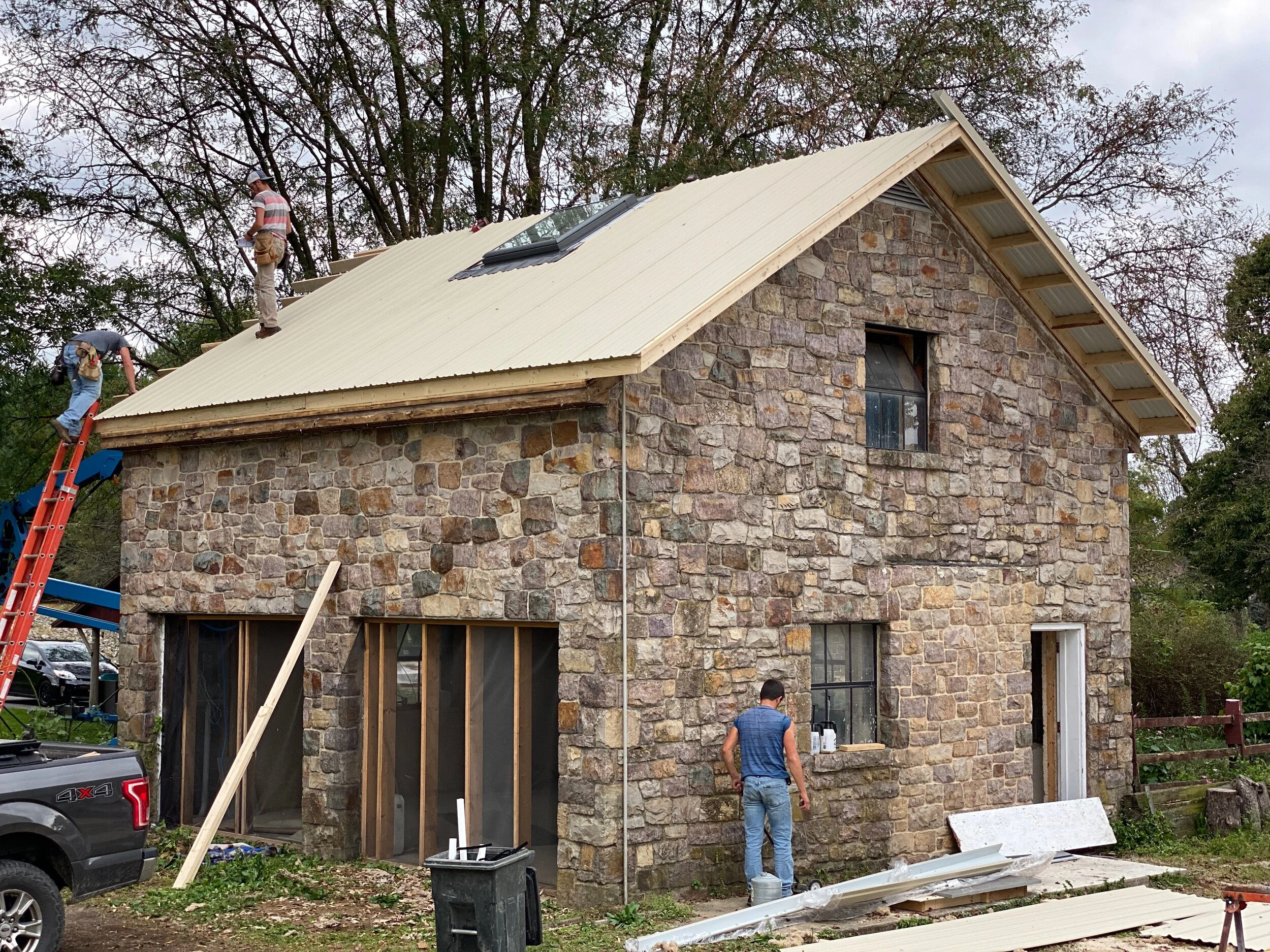Pennsylvania's Hemp Builders: Collaboration and Creativity
A stone guest cottage in western Pennsylvania has been remodeled with hempcrete by Coexist Build.
By Jean Lotus
Before the 80-year U.S. prohibition of marijuana and hemp, the hemp industry in Pennsylvania was one of the oldest in the United States. Hemp was grown in the colony ever since 1683, when William Penn and the General Assembly declared the plant one of the four staples of the colony.
In more recent times, Pennsylvania was a hemp early adopter, as federal laws criminalizing industrial hemp started to break down after the 2014 Farm Bill.
The commonwealth’s legislature passed unanimous and bi-partisan pro-hemp legislation in a single session in 2016, two years before the 2018 Farm Bill legalizing hemp nationwide.
“The enthusiasm is still there, and we’re building out the market,” said Erica Stark, executive director of the Pennsylvania-based National Hemp Association.
“We really want to see the fiber and grain market take off and entice investment to see decorticators built in Pennsylvania,” Stark told Hempbuild Magazine.
Subscribe for HempBuild Magazine’s free newsletter
Today, Pennsylvania’s hemp industry is moving forward thanks to collaboration among farmers, entrepreneurs, researchers and the Pennsylvania Department of Agriculture.
Among hemp builders in Pennsylvania, collaboration makes it possible to advance in an emerging industry.
The state’s department of agriculture has announced multiple grants for hemp farmers, entrepreneurs and nonprofits, including several for hemp builders.
Most recently, the ag department announced $157,000 in grants for a hemp promotion and marketing program.
“Hemp is an opportunity to revolutionize the norm for everything from agricultural conservation practices to home building,” said Agriculture Secretary Russell Redding, in a statement.
The network of the commonwealth’s hemp entrepreneurs is small and collaborates well, said Cameron McIntosh, founder of Allentown-based Americhanvre, a hempcrete building company.
“We know each other and talk to each other,” McIntosh said. “It’s a big state but we’re all open and helpful. A rising tide, and the boats, and all that,” he said.
Recently McIntosh and another hempcrete company, Coexist Build, partnered to build two structures in New York that used precast blocks and spray hempcrete to cut the curing time of walls in half.
Blandon, PA,-based Coexist Build founders Drew Oberholtzer and wife Anastasiya Konopitskaya received a $75,000 grant from the Department of Agriculture to build the hemp block manufacturing site, which can turn out 1,000 blocks a day, Oberholtzer said.
After 10 years in New York and three in Los Angeles, they find Pennsylvania’s collaborative hemp community helpful in building their business.
“Everyone’s just working together,” Oberholtzer told HempBuild Magazine. The location is low-cost and convenient to the northeast United States, he said.
“We’ve got the urban and rural possibility for infrastructure here,” he added.
Taking a model from the farm-to-table movement in restaurants, Coexist is focusing on localized supply chains. The company casts 8 x 16 x 6-inch pre-cured hempcrete bricks.
Architect Anastasiya Konopitskaya of Coexist Build. Photo Courtesy Coexist
“We can grow the hemp here, we can make the binder, we can make the blocks here,” architect Konopitskaya said. “We are working hard to bring that local economy to Pennsylvania, with a completely in-state supply chain and distribution line.”
The bricks can be used for facades or interior walls with a thin lime mortar. The company also makes an insulation blanket out of hemp fiber. Coexist remodeled a stone vintage building as a hempcrete guesthouse and built a traveling mini hemp house on wheels.
New Castle, PA-based Nonprofit disability organization DON Services is going all in on hemp as part of an overall strategy to remodel and re-sell substandard housing to disabled clients.
DON is remodeling a house with hempcrete to “promote hemp building materials as part of the process to being ready for a decortication facility,” Lori Daytner of DON told HempBuild Magazine
Click here to go to our FREE online community.
Film crews from PBS and New York’s Parsons School of Design will document the project this summer, she said. DON is partnering with Coexist to help document the project on film as well.
“Every state can do what we’re doing in the hemp industry. it just takes people who are really committed and willing to work together,” Daytner said.
“In Pennsylvania we have smaller cities and towns, and a mix of agriculture and manufacturing, and that feeds into how we approach things. That’s part of being a Pennsylvanian. It’s in our DNA,” Daytner added.
Parts of this article appeared in Let’s Talk Hemp.
Jean Lotus is editor and publisher of HempBuild Magazine. jeanlotus@hempbuildmag.com
Please Support Our Classified Advertisers
(To find out more about advertising CLICK HERE).
Training and Education
Publications
Hemp Hurd (shivs)/Hemp Fiber/ Hemp Microfiber
Hempcrete installers/Insulation subcontractors
Haven Earth PMA: Bio-Design and Conscious Project Management Consultancy
Hempknowlogy: Home of the Hempjet: America’s first hempcrete spraying system. Manchaca, TX
Lime Binder
Hemp Batt Insulation/Supplies
Green Builders
Hemp Building Engineers
Hemp Genetics
Professional Associations
Evants



